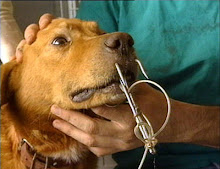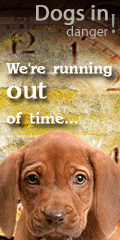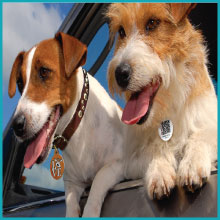Tuesday, January 11, 2011
Have An Old Dog, Here Are Some Tips
Top Ten Tips For Caring For An Old Dog
Dog owners know to put a coat on their dog when they take her out in cold weather, but what about at night, when thermostats are lowered to save money? The issue becomes especially important for older dogs who, just like older people, do not adapt easily to abrupt changes in temperature. Make sure the canine remains comfortable by putting her in a fuzzy dog bed, perhaps with a blanket over her. Hot air rises toward the ceiling while cold air sinks to the floor where the dog sleeps.
That's just one of the many tips found in GOOD OLD DOG: Expert Advice for Keeping Your Aging Dog Happy, Healthy, and Comfortable, just out from the Faculty of the Cummings School of Veterinary Medicine at Tufts University and edited by world-renowned animal behaviorist Nicholas Dodman, BVMS (Houghton Mifflin Harcourt). Ten other tips for dog owners from GOOD OLD DOG:
1. If you fly with Fido, consider buying a climate-controlled pet carrier. The belly of the plane might be temperature-controlled, but not the tarmac in frigid or blazing hot weather.
2. Don't be seduced by the word "Senior" on packages of dog food. That's a marketing tool with no definition other than what the manufacturer wants it to mean. Instead, look for fine print that says the food went through animal feeding tests approved by the Association of American Feed Control Officials, or AAFCO.
3. Don't despair if your aging friend is experiencing urinary incontinence. There is now an arsenal of drugs - and even surgeries - to correct the problem.
4. Check to see if your dog waddles or shuffles when she walks. It could be a sign of arthritis. Limping is not the only clue.
5. Consider buying health care insurance for your older pet. For about $50 a month, and sometimes much less, you can considerably diminish the cost of an expensive surgery or other procedure your older friend may need.
6. If your canine companion stands at the hinge side of a door to go through or gets "stuck" in corners or behind furniture, take her to the vet for a workup. She may have the canine version of Alzheimer's, and the sooner you tend to it, the better your chances of slowing its progression.
7. Put runners down on smooth surfaces like highly polished floors. They may not look good, but aging dogs often have a harder time gaining traction on a smooth surface or getting up from a reclining position.
8. Think your dog may be sick? Take his temperature. Normal is a range - 100 to 102.5 degrees Fahrenheit.
9. Don't smoke. Second-hand smoke is thought to raise the cancer risk for dogs (and other animals), just like it does for people. Even third-hand smoke - the tobacco toxin leftovers that stick on skin, hair, drapes, and so on - can make its way to your dog's lungs.
10. Don't fret if your dog needs abdominal surgery. For people, it can take 6 weeks after an abdominal operation to walk without pain. But people have to use their abdominal muscles to keep themselves upright when they walk, since they only have two legs. Because a dog has four legs, however, all her abdominal muscles have to do is hold in her organs, not expand and contract every time she takes a step. She can generally walk the day of the surgery.
The Faculty of the Cummings School of Veterinary Medicine at Tufts University treat more than twenty-six thousand cases annually, and the school's emergency program is the largest residency program in the United States. They are the authors of Puppy's First Steps.
Nicholas Dodman is a world-renowned animal behaviorist and the best-selling author of the immensely popular The Dog Who Loved Too Much, The Cat Who Cried for Help, and The Well-Adjusted Dog. He has appeared on Oprah, the Today show, Good Morning America, 20/20, and CNN, among many other television and radio programs. He is available for interview about Good Old Dog.
Lawrence Lindner is a New York Times best-selling writer who has penned regular columns for the Washington Post and the Boston Globe and has written for numerous other publications.
Source:
Houghton Mifflin Harcourt
Labels:
Have An Old Dog,
Here Are Some Tips
Subscribe to:
Post Comments (Atom)

















2 comments:
Excellent post. Thanks for sharing.
I might add: make sure to exercise your senior dog regularly. this must be done in concert with their physical condition; not too much to make them sore and not too little as it will reduce the benefits of exercise. This is good for us hoomans too.
Thanks for the added tip, I know there are so many more out there.
Post a Comment